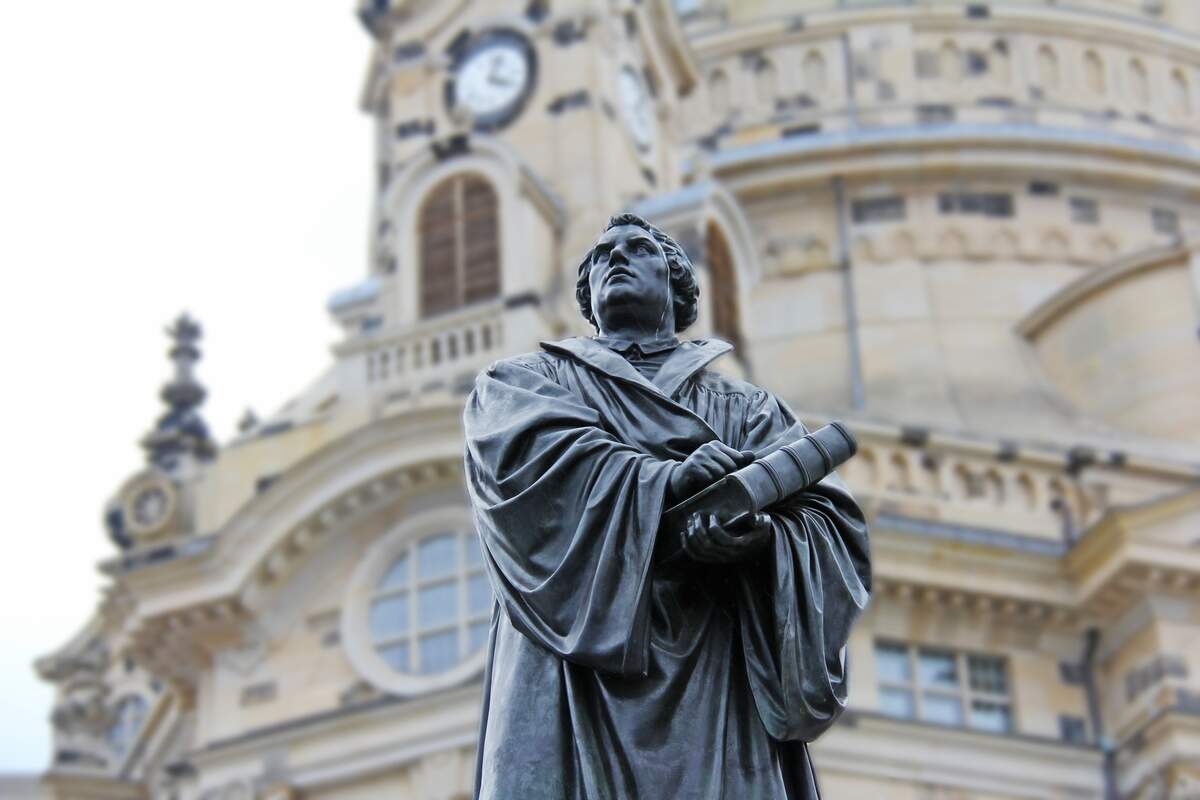

Reformation Day
Reformation Day marks the anniversary of the day in 1517 that Martin Luther posted his Ninety-five Theses—formally known as the Disputation of Martin Luther on the Power and Efficacy of Indulgences—on the door of the Castle Church (All Saints' Church) in Wittenberg, in the Holy Roman Empire's Electorate of Saxony, which now is part of Germany. Also on the day, Luther wrote a letter to Albrecht, Archbishop of Mainz and Magdeburg, to protest against the sale of indulgences, and included a copy of his Ninety-five Theses with it. Protestants consider this date to be the starting point of the Protestant Reformation, and Reformation Day is a remembrance day of this start.
Martin Luther, born in 1483, was an Augustinian monk and university lecturer at the time he wrote the Ninety-five Theses, which spoke against the selling of indulgences, or reprieves from penance. Johann Tetzel had recently been sent to the area to sell indulgences to raise money to rebuild St. Peter's Basilica in Rome. He was known to have said, "as soon as the coin in the coffer rings, the soul from purgatory (or into heaven) springs." Luther was adamantly opposed to this, since he believed in the doctrine of justification, that salvation came by grace alone and through faith in Jesus Christ alone. The Reformation that Luther sparked brought the doctrine of justification to the forefront.
Luther may have chosen October 31st to post the Ninety-five Theses because this was the day before All Saints' Day, when many people would be coming to the church to view relics, which were to reduce time in purgatory in a way similar to indulgences. Shortly after Luther posted the Ninety-five Theses, they were translated from Latin into German, and distributed across Germany and then Europe. In the immediate years that followed, many came to Wittenberg to hear Luther speak, and he published a number of other works. In 1521, Luther was summoned to the Diet of Worms and was excommunicated. Following this, Luther translated the Bible into German and put out German pamphlets while under the protection of Friederich, the Elector of Saxony.
Reformation Day marks the beginning of the Protestant Reformation that took place during the sixteenth century, which protested the teaching of unbiblical doctrines like salvation through good works, purgatory, false doctrines, the selling of indulgences, and the treasury of merit, as well as corruption that was prevalent within the Catholic Church. The Reformation was a movement to purify the church, and it said the Bible, not tradition, should be the only source of spiritual authority. The ideas of the Reformation weren't completely new, but Luther and others used the printing press to disseminate them to a wide audience. It was not only Luther who challenged the pope's authority and questioned if the Catholic Church should hold all the power to define Christian practice. John Calvin and Henry VIII were two other reformers of the time. Together, these reformers wanted power in the church to be decentralized, and in the hands of pastors and princes.
Lutheran churches in Europe first marked Reformation on different dates, including Luther's birth date, death date, and the date of the presentation of the Augsburg Confession. After the Reformation's centennial year, in 1617, October 31st became the focus, and during the sesquicentennial year, in 1667, October 31st was decreed as an annual Reformation Day in Saxony by John George II, the Elector of Saxony. Other German Lutheran and Union territorial churches gradually shifted observances to this date as well, or to the Sunday preceding or following it, depending on the church. Lutheran and Reformed (Calvinist) churches observe it, as do some other Protestant churches, like Evangelical and Anglican. It has even been recognized by the Catholic Church. The day's liturgical color is red. Some countries also officially recognize Reformation Day, like Chile and Slovenia, as do some German states.
Wars, persecutions, and a response by the Catholic Church known as the Counter-Reformation came after the onset of the Protestant Reformation. The end of the Reformation is considered to be between 1555, when the Peace of Augsburg was signed, which allowed Catholicism and Lutheranism to exist together in Germany, and 1648, when the Treaty of Westphalia was signed, which ended the Thirty Years' War. By the end of the Reformation, Lutheranism was the state religion in much of Germany, Scandinavia, and the Baltics. These great changes that swept the Catholic Church began with the nailing of the Ninety-five Theses to a church door on today's date in 1517, Reformation Day.
How to Observe Reformation Day
Attending a Reformation Day church service at a Lutheran church or other Protestant church is an appropriate way to take part in the day. Depending on where you go, the service may be held on a nearby Sunday. Some other ideas are to read the Ninety-five Theses or a book about Martin Luther. The most ambitious could plan a trip to All Saints' Church in Wittenberg, where Luther posted the Ninety-five Theses, which also happens to be the location where Luther is buried.





















